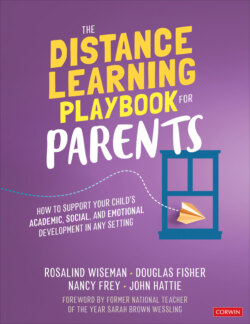Читать книгу The Distance Learning Playbook for Parents - Rosalind Wiseman - Страница 19
На сайте Литреса книга снята с продажи.
Communicate With Teachers
ОглавлениеThink of your child’s teacher as your partner. You are in this together. You do not need to be a subject matter expert of every academic specialty. We are not asking you to teach chemistry, algebraic thinking, phonics, or how to write an argumentative speech, even though you might be able to. The teacher is still the teacher. In studies of parent frustration regarding distance learning in 2020, it was common for family members to note that they needed more communication from their children’s teachers regarding schedules, tasks, and assignments. They also wanted their children to receive more feedback from the teacher and to spend more time with the teacher. So, let’s focus on the communication. Teachers should send weekly schedules in advance. You should know when your child is expected to be present for live sessions and what the workflow is for the week. Let’s focus on the quality and timing of the contact between teachers and parents.
We believe that your child, and by extension you, should be able to answer three basic questions for each learning experience:
➔ What am I learning today? This is the content that students need to master.
➔ Why am I learning it? This is the relevance of the lesson.
➔ How will I know that I have learned it? This is the criteria that can be used to determine success.
If lessons are random collections of tasks, children are less likely to engage and thus learn. If the teacher does not make the answers to these questions clear, feel free to ask for clarification in a kind way. If you don’t get a satisfactory answer, you might have to step in and help your child figure out the answers to these questions. They really are that important.
TALK TO YOUR CHILD MORE ABOUT THEIR LEARNING THAN WHAT THEY ARE “DOING.”
Talk to your child more about their learning than what they are “doing.” Welcome their struggles, their grappling with the ideas, because learning wasn’t meant to be easy. Any indication it is, is conveying to your child that they are not smart, not able, and denies them the learning that learning is hard work.
Partnerships require strong communication to be effective. As such, you should establish a communication plan with your child’s teacher. Ask the teacher how they prefer the communication to work. Emails? Messages in the learning management system? Some teachers use one-way messaging systems and others provide cell phone numbers. There is no one right way, but try to honor the communication system that the teacher prefers.
We encourage you to communicate with the teacher on a weekly basis (younger children) and to teach your child to reach out to teachers with questions (teens). That’s not to say you end your responsibility to monitor your child’s learning when they turn thirteen, but rather that they learn to accept some responsibility. Of course, you’ll still monitor their attendance and task completion. During distance learning, teachers are typically provided additional time for planning and communicating. It’s important that you know the expectations, know how your child is doing, and know what you can do to help. Again, you’re not the teacher but you are an important part of the system that will ensure your child learns.
And, please remember that the teacher is human. The teacher is also working from home and may have many stressors in their life. Some teachers have small children at home; others have elderly family members. We are all in this together and we will get through this, together. However, if you feel that your child’s needs are not being met after communicating regularly, first contact the teacher expressing your concerns through the mode of communication that the teacher has requested. If you don’t receive a response or feel their response is inadequate, you should feel free to attend the office hours of the principal or send a quick message requesting a conversation. This is not intended to get the teacher in trouble but rather to address any misunderstandings and get things back on track.
You may need to be a bit more active in your child’s education during these times. As parent.com notes, parent is a verb. Teachers and parents need each other. These are the key messages:
➔ Remember, you do not have to be “the teacher” to ensure that your child learns.
➔ If not provided, ask for a weekly schedule so that you can build routines around it.
➔ Make sure your child knows what is to be learned, why they are learning it, and when they will know they have achieved success.
➔ Develop a communication system with the teacher(s).
➔ Be involved in your child’s education.
